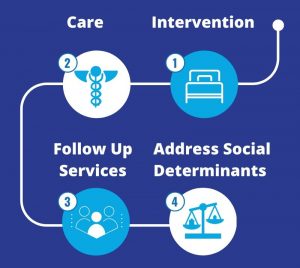By: Joseph Bryant
MONTGOMERY, ALABAMA – A Montgomery hospital could soon become the starting point for community healing with opportunities to break vicious cycles of violence that plague the River Region and much of the country.
Montgomery City and County officials dedicated $2 million of the Montgomery Thrive initiative to launch a three-year Hospital-based Violence Intervention Program (HVIP). Conversations and early planning are underway with hospital administrators to design the community-based program.

HVIPs provide culturally competent specialists and case managers to deliver crisis intervention, links to community-based services, and long-term case management. Officials are currently soliciting proposals from potential partners to operate the program. A final decision is expected in early 2023.
Hospitals are natural starting points to begin conversations and offer valuable resources, said Montgomery Mayor Steven Reed.
“Just as paramedics, nurses and doctors gather at hospitals to treat physical harm, this program will provide trained community specialists who will respond to immediate and long-term needs brought on through violence,” Reed said. “We know that victims are more open to making life changes in the immediate aftermath of violent assaults.”
Montgomery residents in a community-wide surveys named violence prevention and mental health among their top priorities.
“These programs are holistic and can save lives, which makes it one of the best investments we could make through Montgomery Thrive,” said Montgomery County Commission Chairman Doug Singleton. “By partnering with our hospitals and trained coordinators, we have an opportunity to uproot the very causes of devastating violence that impacts all too many of our neighbors.”
Trained violence prevention professionals will work with clients and their families to create a plan to address their immediate and longer-term needs. Intensive case management will last a year. Case managers will have the ability to provide a variety of services such as arranging transportation to work, to providing trauma counseling for children.
“Larger cities have implemented these programs in their hospitals to try to break the cycle of violence and to reduce retaliatory violence,” said Susan Kennedy, an attorney with Levitate Legal and Consulting, the Montgomery-based firm hired to coordinate the Montgomery Thrive initiative. “This will be an effective tool to address some of the violent crime that has been occurring in Montgomery.”
With the new intervention program, the River Region joins a national movement designed to identify and address violence shortly after it occurs.
“Gun violence is a public health crisis that has devastated far too many communities in this country, but the good news is that effective solutions exist, and cities nationwide, like Montgomery, are recognizing the critical need to implement these solutions,” said Kyle Fischer, MD, MPH, policy director for the Health Alliance for Violence Intervention.
The HAVI is a national organization working in 85 cities across the country to build a network of hospital-based violence intervention programs. Fischer is also a clinical assistant professor of emergency medicine at the University of Maryland School of Medicine.
“These programs engage with violently injured patients in the hospital through credible messengers who discourage retribution and coordinate wraparound services that address the psychological trauma resulting from violent injury as well as the social factors that put these patients at high risk for landing back in the hospital with another violent injury,” Fischer said.
Statistics illustrate a clear need for intervention. Patients treated for violent injury are 45 percent more likely to be injured again within five years.
Patients and family members in areas without HVIPs are three-times more likely to be arrested for violent crimes, two-times more likely to be convicted of any crime, and are four-times more likely to be convicted of a violent crime. Also, almost a third of violence is retaliatory.
“It’s really important that we get in there and interrupt the cycle,” Kennedy said. “It has been shown to save lives and break a cycle of violence for families and an entire community.”
Montgomery’s launch of hospital-based violence intervention programs comes at the same time that another major Alabama county plans a similar initiative. Officials in Jefferson County and Birmingham cite similar need and evidence for the hospital-based intervention.
With gun violence as a leading cause of premature death in Jefferson County, the Jefferson County Department of Health made it a priority to establish a public health strategy to address the problem, said Jefferson County Health Officer Mark Wilson, MD.
The health department committed funds to start and help sustain a program, and the Birmingham City Council dedicated some of its American Rescue Plan Act funds to expand the program after its first year. UAB Trauma committed to being the hospital partner.
Jefferson County’s program is set to launch in January 2023.
“This is just one piece in a very complex puzzle,” Wilson said. “But we are pleased to be in a position to offer a glimmer of hope in the midst of this terrible plague of violence.”
Montgomery Thrive is a nearly $86 million program to support transformative projects with funding from the American Rescue Plan Act (ARPA).
Montgomery Thrive spending priorities are diverse and include support for public safety, mental health crisis intervention, community restoration initiatives, small business assistance, waste disposal infrastructure, and working to bring broadband internet services to the entire county. Each project is the result of community input from citizens that were collected through surveys.